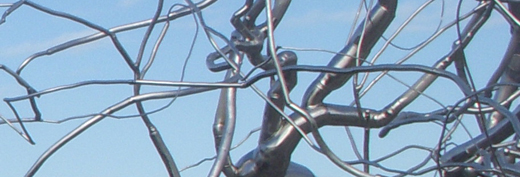Dear Diary: I Was a Teenaged Tuber

Roxy Paine’s Maelstrom will be coming down soon, at least from the Museum’s roof garden. It was my second-favorite roof garden installation, after the anthology of works by Cai Guo-Qiang.
It didn’t suggest “maelstrom” to me. It reminded me of the woods. The woods — I must decline to capitalize the name or to put it in quotation marks, so quotidian was it for us — was a seven-acre tract of undeveloped land that started almost across the street from our house on Hathaway Road in Eastchester, where I lived from 1955 to 1960, when we moved into the house in Bronxville proper that we would abandon for a place in Houston’s Tanglewood in 1968. “Tanglewood” — but Roxy Paine’s tubes and bulbs don’t make me think of Houston, that’s for sure. I came away from my few years in the woods (it seemed like forever) permanently disappointed by untrammeled nature. Which only made me appreciate Ms Paine’s sculpture more fully. Whatever she may have thought she was creating with all that velvety metal, her discipline ended up capturing, at least for me, the sloppiness of the local wilderness.
I was going to write on a very bourgeois theme this evening, my love of comfort, and my corresponding dislike of the sharp irritations of Modernism. For a week now, I’ve been considering the Hilobrow platform (for want of a shorter way of putting it), according to which, without a doubt, I am a rank middlebrow. A whole platoon!
Someone wrote that the middlebrow person is terrified of lust and magnificence — lust being “low” and magnificence being, well, you get it. And the only thing that I argued with was “terrified.” Magnificence is blinding and exhausting; the true secret of Versailles is that it is not very magnificent. Just magnificent enough to be lived with every day. As for lust, or desire, or whatever it was, I rejoice that it has been a long, long time since I was last consumed by it. There are lots of things that I want. I want to get up in the morning, and I want to want to read the paper (and I usually do). I want to write entries for this site. But I’m afraid that I don’t really want anything that I can’t have. Desire for the unattainable is both pathetic and monstrous.
At McNally Jackson the other night, Edmund White talked about Rimbaud’s invention of obscurity. I liked the frank way in which he conceded that his biographical subject’s work was pointedly, self-consciously difficult, or perhaps impossible, to understand. The impenetrability of Les Illuminations doesn’t bother me, though, because I feel that I’m expected to delight in the voluptuousness of the obscurities, not to decode them. Wallace Stevens generates the same kind of happiness. Who cares what it means;
                                                 This is the barrenness
Of the fertile thing that can attain no more.
is gorgeous! There are more beautiful chains of words in Credences of Summer, but no thoughts more luxurious.
In the end, what it comes down to is that I developed an early taste for the courtly pleasures. I find the greatest beauty in ease (which is certainly not easy!), while deliberate difficulty of any kind strikes me as untutored rudeness, almost always devoid of interest.
Against all of this fine filigree, you will readily understand the pain of wanting to be the friend of someone who does not want you for one. The Cai photograph reminded me of that. I remember a day up there that was just that blue. Â
